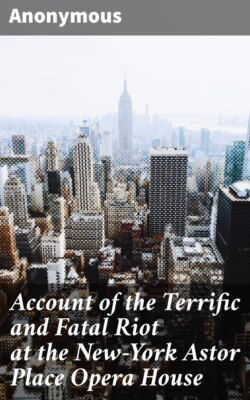Читать книгу Account of the Terrific and Fatal Riot at the New-York Astor Place Opera House - Anonymous - Страница 4
ОглавлениеTHERIOT.
CHAPTER FIRST.
THE NIGHT OF THE 10TH OF MAY.
On the night of the 10th of May, 1849, the Empire City, the great metropolis of the Union, was the scene of one of those horrors of civilization, which for a time make the great heart of humanity stop in its beatings. In the darkness of night, thousands of citizens were gathered in a central square of the most aristocratic quarter of New York—gathered around one of its most conspicuous and magnificent edifices, the Astor-Place Opera House.
This Opera House was built expressly for the performance of the Italian Opera, but has been used at intervals for the legitimate drama, for vaudevilles, and for balls and concerts. It is fitted up and decorated with taste and magnificence, and in the opera seasons has been attended by the most wealthy and fashionable people, who have made extravagant displays of luxurious adornment. While the private boxes were taken by the season, by those who wished to enjoy the music, liked the display, and could afford the expenditure, the other seats were let at a dollar admission, and the upper tier or amphitheatre was reserved for people of humbler means or more modest pretensions, at twenty-five cents a ticket.
Around this edifice, we say, a vast crowd was gathered. On the stage the English actor Macready was trying to play the part of Macbeth, in which he was interrupted by hisses and hootings, and encouraged by the cheers of a large audience, who had crowded the house to sustain him. On the outside a mob was gathering, trying to force an entrance into the house, and throwing volleys of stones at the barricaded windows. In the house the police were arresting those who made the disturbance—outside they were driven back by volleys of paving-stones.
In the midst of this scene of clamor and outrage, was heard the clatter of a troop of horse approaching the scene. “The military—the military are coming!” was the exclamation of the crowd. Further on was heard the quick tramp of companies of infantry, and there was seen the gleam of bayonets. A cry of rage burst from the mob. The appearance of an armed force seemed to inspire them with a sudden fury. They ceased storming the Opera House, and turned their volleys against the horsemen. Amid piercing yells and execrations, men were knocked from their horses, the untrained animals were frightened, and the force was speedily routed, and could not afterwards be rallied to perform any efficient service.
Now came the turn of the infantry. They marched down the sidewalk in a solid column; but had no sooner taken up a position for the protection of the house, than they were assailed with volleys of missals. Soldiers were knocked down and carried off wounded. Officers were disabled. An attempt to charge with the bayonet was frustrated by the dense crowd seizing the muskets, and attempting to wrest them from the hands of the soldiers. At last the awful word was given to fire—there was a gleam of sulphurous light, a sharp quick rattle, and here and there in the crowd a man sank upon the pavement with a deep groan or a death rattle. Then came a more furious attack, and a wild yell of vengeance! Then the rattle of another death-dealing volley, far more fatal than the first. The ground was covered with killed and wounded—the pavement was stained with blood. A panic seized the multitude, which broke and scattered in every direction. In the darkness of the night yells of rage, screams of agony, and dying groans were mingled together. Groups of men took up the wounded and the dead, and conveyed them to the neighboring apothecary shops, station-houses, and the hospital.
The horrors of that night can never be described. We looked over the scene that misty midnight. The military, resting from their work of death, in stern silence were grimly guarding the Opera House. Its interior was a rendezvous and a hospital for the wounded military and police. Here and there around the building, and at the corners of the streets were crowds of men talking in deep and earnest tones of indignation. There were little processions moving off with the dead or mutilated bodies of their friends and relations. A husband, uttering frenzied curses, followed his mortally wounded wife to the hospital. An aged mother found her only son, the sole support of her declining years, in the agonies of death. Many a wife sat watching at home, in terror and alarm for her absent husband. It was an evening of dread—and it became a night of horror, which on the morrow, when the awful tragedy became more widely known, settled down upon the city like a funeral pall.
The result of that night’s work was the death of twenty-two victims, either shot dead upon the spot or mortally wounded, so that they died within a few days; and the wounding of some thirty more, many of whom will be maimed for life. Into the causes which led to a result so fatal, and all the circumstances attending it, it will now be our duty to inquire.
